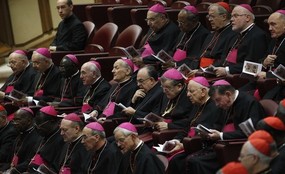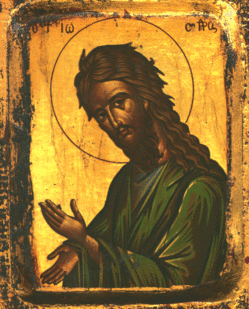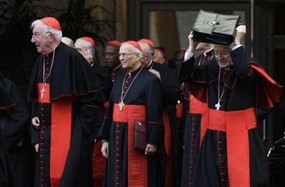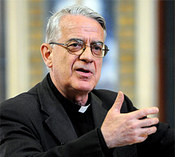The Congregation for the Doctrine of the Faith delivered a circular letter to the world’s bishops asking for help in working for the common good of the faithful –protecting children from abusive priests. The CDF wants each of the bishops’ conferences around the globe to develop the appropriate processes assist the diocesan bishops in helping victim, educating the ecclesial community, forming priests, and being clear agents of charity and justice.
Tag: sex abuse crisis
Is the Pope’s Irish proposal reasonable?
Haven’t been thinking of the Pope’s letter to the Church in Ireland regarding the sexual abuse problems in a while? Let’s start thinking anew: the year of prayer that the Pope asked for is coming to an with Easter. I’d like to know what’s different.
Diarmuid Martin: Church in Ireland had grown beyond what’s legitimate: self-centered & arrogant
The Catholic Church in Ireland is facing what we in the USA continue to face and the Church in parts of the world also face or will face: sin. Archbishop Diarmuid Martin, Archbishop of Dublin, is working overtime to renew himself and the Church he leads to a deeper contrition and to a renewed sense of mission as a disciple of Jesus Christ. Like Saint John the Baptist, Archbishop Martin tells us clearly that self-centeredness and arrogance are not legitimate virtues for Catholics to allow to dwell in the heart and in the way one acts. What the Archbishop says about his Church can be said of us personally, and the Church in the USA. Time to change!!!! As the Baptist says, “I must decrease and He –Jesus– must increase.
The Gospel of this morning’s
Mass recalls that great figure: John the Baptist. John’s task was to announce
the coming of Jesus. He was called to reawaken a sense of expectation among a
people that had grown tired and distant from God. He was called to bring
renewal to institutional expressions of religion which, at the time, had so
often become fossilised into mere formulae or external ritual. John’s work was
extraordinary. He attracted thousands to come out into the desert to see
him. He wrought conversion on a vast scale.
John was a man who stood out.
His strange dress – the wild camel hair and the leather girdle – was not chosen
as a publicity gimmick or a trademark. His message was one that spoke of
rising above conventional ways of thinking, conventional expectations and
attitudes. He shunned the external amenities of a comfortable life
because he wanted to show his absolute dependence on God. His detachment
from life’s comforts gave him the freedom to truly recognise the message of
Jesus.
The figure of John serves as a warning to us today, to all believers, to
the Church and to Church organizations of every age of our need to draw our
strength from Christ alone, rather than from identifying with the cultural
patterns and fashions of the day, which in any case come and go.
The Pope & his cardinals met today
 Billed my some as extra-ordinary, but likely seen by insiders as ordinary, Pope Benedict met with his cardinals and the new cardinals –24 of them– he intends to make tomorrow, in a forum where information is exchanged and consultation given. The meeting of Pope and cardinals was conducted in the context of prayer. Prayer and exchange, not the making of decisions was the format. It is estimated that about 150 of the worlds 203 cardinals met today. Topics ranged from the sacred Liturgy and religious freedom, but also the exercise of religion, secularism, conversion and entering into full communion with the Catholic Church to healthcare. Since this is also the 10th anniversary of Dominus Iesus, the document which recalls that salvation comes uniquely and universally through the person of Jesus Christ, the Pope and cardinals will reflect on the impact this document has made since its publication.
Billed my some as extra-ordinary, but likely seen by insiders as ordinary, Pope Benedict met with his cardinals and the new cardinals –24 of them– he intends to make tomorrow, in a forum where information is exchanged and consultation given. The meeting of Pope and cardinals was conducted in the context of prayer. Prayer and exchange, not the making of decisions was the format. It is estimated that about 150 of the worlds 203 cardinals met today. Topics ranged from the sacred Liturgy and religious freedom, but also the exercise of religion, secularism, conversion and entering into full communion with the Catholic Church to healthcare. Since this is also the 10th anniversary of Dominus Iesus, the document which recalls that salvation comes uniquely and universally through the person of Jesus Christ, the Pope and cardinals will reflect on the impact this document has made since its publication.
Responding to an Episcopal priest on giving communion to a dog
The other day I made a post on this blog about a Canadian
woman priest giving Communion to a dog. A reader of the Communio blog, Lydia
wrote to me saying:
I am a priest in the Episcopal Church in the US.
The Anglican Communion does not have priestesses. I am sure that you know
that. Perhaps you are just being sarcastic.
Personally, I would rather have my
Church known for giving communion to a dog than for the fact that many of my
priests molested children, in countries all over the world, and that
my Bishops did all that they could to ignore complaints about the abuse,
to hide the problem, and to protect the offending clergy.
My response to Lydia
The dictionary defines a priestess as a female priest. It’s a perfectly good
English word; in fact, the Anglican C.S. Lewis wrote an essay called, “Priestesses
in the Church.” If the word “priestess” has a strangely non-Christian
sound, perhaps that is because in churches that claim apostolic succession,
there is no precedent for female priests. As Lewis pointed out, there have been
many religions with female priests (priestesses), but these religions are very
different from Christianity as it has been known for 20 centuries.
In any case,
the word “deaconess” is not considered offensive, so why should
“priestess” be so considered? If masculine imagery for divine transcendence
needs to be balanced by feminine imagery of divine immanence, why not say that
priest and priestess together represent the divine more fully, like Yin and
Yang? My impression is that many modern Anglicans (including women
clergypersons) think on those lines. So why fight about the sound of a word
when its substantive meaning is considered OK?
As for the Catholic Church being
“known for” molestation of children and minors: well, the Anglican
Church in Canada and Australia has been racked by similar problems, particularly
in residential schools, with some dioceses being nearly bankrupted. I am saddened
by the Anglicans’ troubles since the attacks on their schools is an indirect
form of anti-Christian persecution at the hands of a hostile state. As such,
this abuse hysteria threatens us all because it is premised on the assumption
that the sins of a few abusive clergy should be avenged on the entire Body of
Christ. In the case of any other group besides the clergy, this would be
considered unjust prejudice and overreaction.
Statistically speaking, Catholic
priests are no more likely to molest than ministers of other religions; it’s
just that we are a much larger church and that our dioceses are legally set up
as a corporation sole, thus inviting crippling lawsuits and lots of bad
publicity. That said, I do agree that we Catholics are not in a position to
cast any stones on the sexual abuse issue. And so this blog has not done so.
Gross
liturgical abuses and irreverence are a different sort of issue. These
liturgical-sacramental aberrations are public acts done in an official
capacity, not secret sins or obvious crimes. And, in fact, I do emphatically
criticize and abhor similar liturgical abuses among Catholics and wish that
more Catholic parishes had the reverence and decorum to be found in many
high-church Episcopal parishes. It’s not a matter of either side of the
Reformation divide being free of sin or failure: it’s just that without an
authoritative center of communion and teaching and practice, Anglicanism can’t
easily set any parameters for legitimate diversity within itself. And
Archbishop Williams himself would sadly admit that that is unfortunately the
case.
Church of the ‘Times’
Thanks to Gary Stern at Blogging Religiously for bringing the recent Kenneth Woodward article, “Church of the ‘Times‘” to my attention. Commonweal magazine will be publishing a print edition of this article in the May 7, 2010 edition. Woodward’s perspective is just one among many, but does it have merit????
Anti-Catholicism, Again: a deeper look into clergy sex abuse
Joseph (Jody) Bottum, Editor of First Things and a contributing editor at the Weekly Standard, wrote what may go down as THE best essay on the sex abuse crisis facing the Catholic Church in the current issue of the Weekly Standard, “Anti-Catholicism: The permanent scandal of the Vatican” (May 3, 2010). Bottum’s piece is long but it’s worth a thorough read. For those looking for the print edition, the article hit the news stands on Saturday in most places but the link is noted above.
The Pope meets 8 victims of sexual abuse in Malta: a profound experience
The prominent Italian newspaper, Corriere della Sera, published a beautiful quote of Lawrence Grech, a victim of sexual abuse, who met with Pope Benedict during his pastoral visit to Malta Saturday and Sunday and had a profound experience. Mr. Grech said that he felt liberated, that a great stone lifted after speaking with Benedict. Grech went on to say that after this encounter he was a more convinced Catholic and that this was “the greatest gift after the birth of my daughter.”
Vatican gives guidelines on sex abuse allegations
The Holy See has put in one spot on their webpage the numerous documents concerning the abuse of minors, and the Church’s response. Check it out. The documentation given here is crucial in understanding how the Church thinks and acts pastorally in view of sexual abuse of minors.
Lombardi’s statement on clergy sex abuse
This past Friday (April 9) Jesuit Father Federico Lombardi, director
of the Vatican press office, spoke about the sexual abuse of minors. Remembering
that Father Lombardi is only the press director for the Vatican and not someone
who sets policy, this statement fine. It evokes some questions and it opens
conversation, in my opinion. I think it is necessary to read the address in its entirety because there are a number of points made therein that were not mentioned –no surprise– in the secular media. This is his statement as published by Vatican
Radio.
The debate concerning sexual abuse, and not only that committed by the
clergy, continues with news items and comments of various kinds. How can we
sail through these stormy waters while maintaining a secure course and
responding to the evangelical motto ‘Duc in altum’ — Put out into the deep?
In the first place, by continuing to seek truth, and peace
for the victims. One of the most striking things is that today so many inner
wounds are coming to light, wounds that also date to many years (sometimes
decades) ago, but evidently still open. Many victims do not seek financial
compensation but inner assistance, a judgment on their painful individual
experiences. There is something that we have yet to fully understand; perhaps
we need a more profound experience of events that have had such a negative
impact on the lives of individuals, of the Church and of society. One example
of this, at the collective level, is the hatred and violence of conflicts
between peoples which are, as we see, so difficult to overcome in true
reconciliation. Abuse opens wounds at a deep inner level. For this reason,
certain episcopates were right when they courageously resumed developing ways
and places in which victims could express themselves freely, listening to them
without taking it for granted that the problem had already been faced and
overcome by the workshops established sometime ago. For this reason also, other
episcopates and individual bishops were right to intervene paternally, showing
spiritual, liturgical and human concern for victims. It seems certain that the
number of new accusations of abuse is falling, as is happening in the United
States, but for many people the road to profound healing is only now beginning,
and for others it has yet to start. In the context of this concern for victims,
the Pope has written of his readiness to hold new meetings with then, thus
sharing in the journey of the entire ecclesial community. But this journey, in
order to achieve profound effects, must take place in respect for people and
the search for peace.
Alongside concern for victims we must continue to
implement, decisively and truthfully, the correct procedures for the canonical
judgment of the guilty, and for collaborating with the civil authorities in
matters concerning their judicial and penal competencies, taking the specific
norms and situations of the various countries into account. Only in this way
can we hope effectively to rebuild a climate of justice and complete trust in
the ecclesiastical institution. It has happened that a number of leaders of
communities and institutions, through inexperience or unpreparedness, have not
had a ready understanding of the protocols and criteria for intervention which
could have helped them intervene decisively even when this was very difficult or
painful for them, also because they were often surprised by the accusations.
But, while civil law intervenes through general norms, canon law must take
account of the specific moral gravity of an abuse of the trust placed in
persons who hold positions of responsibility within the ecclesial community,
and of the flagrant contradiction with the conduct they should show. In this
sense, transparency and rigour are urgent requirements if the Church is to bear
witness to wise and just government.
The formation and selection of candidates
for the priesthood, and more generally of the staff of educational and pastoral
institutions, is the basis for an effective prevention of the risk of future
abuses. Achieving a healthy maturity of the personality, also from a sexual
point of view, has always been a difficult challenge, but today it is
particularly so, although the best psychological and medical knowledge is of
great help in spiritual and moral formation. It has been observed that the
greatest frequency of abuses coincided with the most intense period of the
‘sexual revolution’ of past decades. Formation must take account of this
context and of the more general context of secularisation. In the final
analysis, this means rediscovering and reaffirming the sense and importance of
sexuality, chastity and emotional relationships in today’s world, and doing so
in concrete, not just verbal or abstract, terms. What a source of disorder and
suffering their violation or undervaluation can be! As the Pope observed in his
Letter to Irish Catholics, a Christian priestly life today can respond to the
requirements of its vocation only by truly nourishing itself at the wellspring
of faith and friendship with Christ.
People who love truth and the objective
evaluation of problems will know where to seek and find information for a more
overall comprehension of the problem of paedophilia and the sexual abuse of
minors in our time, in different countries, understanding its range and
pervasiveness. Thus they will be able to achieve a better understanding of the
degree to which the Catholic Church shares problems that are not only her own,
to what extent they have particular gravity for her and require specific
interventions, and, finally, the extent to which the experience the Church is going
through in this field may also be useful for other institutions or for society
as a whole. In this context, we truly feel that the communications media have
not yet worked sufficiently, especially in countries in which the Church has a
stronger presence and in which she is more easily subject to criticism. Yet,
documents such as the national U.S. report on the mistreatment of children
deserve to be better known in order to understand what fields require urgent
social intervention, and the proportions of the problem. In the U.S.A. in 2008
alone, 62,000 people were identified as having committed acts of abuse against
minors, while the proportion of Catholic priests was so small as not to be
taken into consideration as a group.
The protection of minors and young people
is, then, an immense and unlimited field, which goes well beyond the specific
problem concerning certain members of the clergy. People who sensitively,
generously and attentively dedicate their efforts to this problem deserve
gratitude, respect and encouragement from everyone, especially from the
ecclesial and civil authorities. Theirs is an essential contribution for the
serenity and credibility of the education and formation of young people, both
inside and outside the Church. The Pope rightly expressed words of great
appreciation for them in his Letter to Irish Catholics, though naturally with a
view to a vaster horizon.
Finally, Pope Benedict XVI, a coherent guide along
the path of rigour and truth, merits all respect and support, testimony of
which is reaching him from all parts of the Church. He is a pastor well capable
of facing — with great rectitude and confidence — this difficult time in
which there is no lack of criticism and unfounded insinuations. It must be said
that he is a Pope who has spoken a lot about the Truth of God and about respect
for truth; and he has become a credible witness of this. We accompany him,
learning from him the constancy necessary to grow in truth and transparency,
continuing to open our horizons to the serious problems of the world and
responding patiently to the slow and gradual release of partial or presumed
‘revelations’ which seek to undermine his credibility, and that of other
institutions or individuals of the Church.
This patient and solid love of truth
is necessary, in the Church, in the society in which we live, in communicating
and in writing, if we wish to serve rather than confuse our fellow men and
women.


